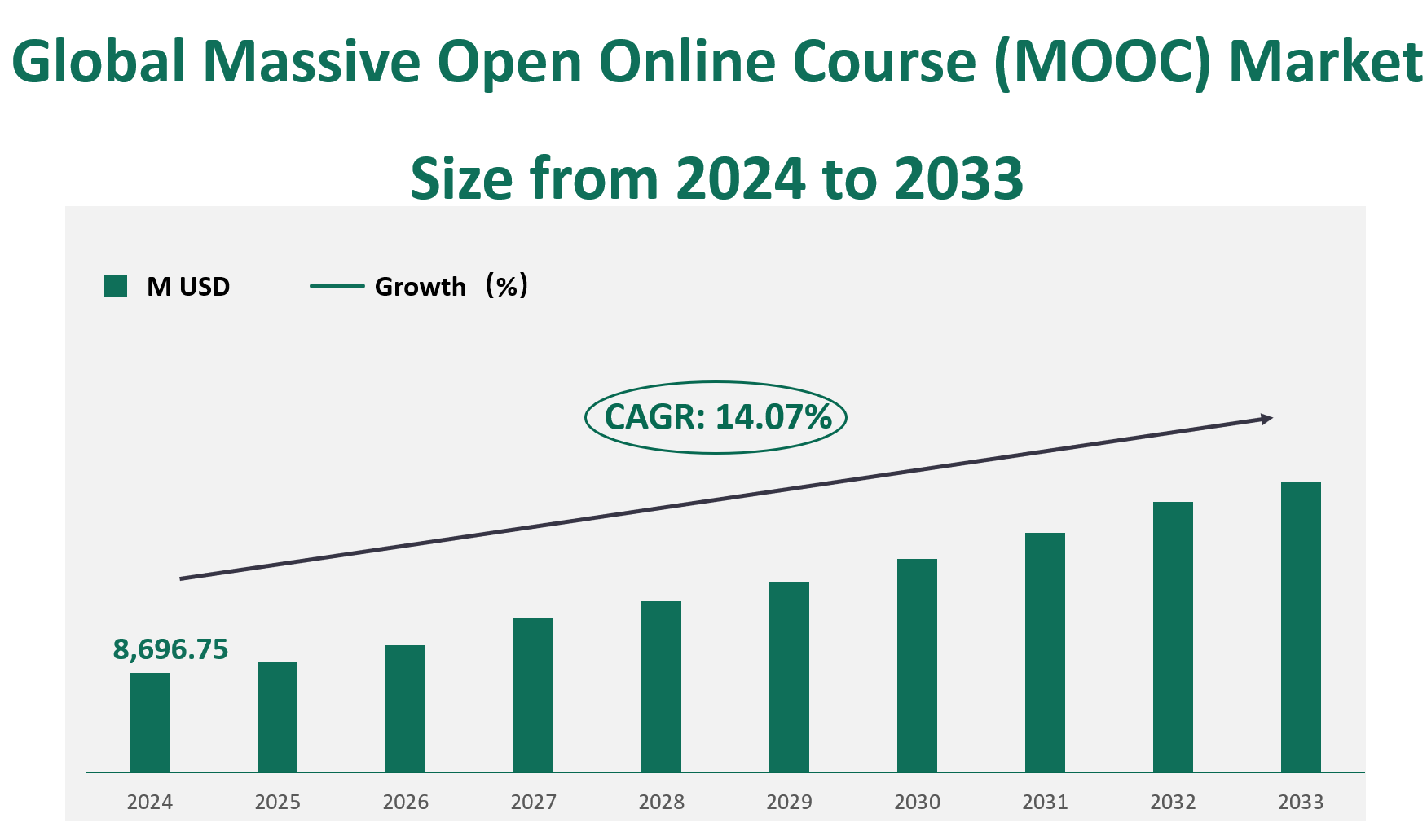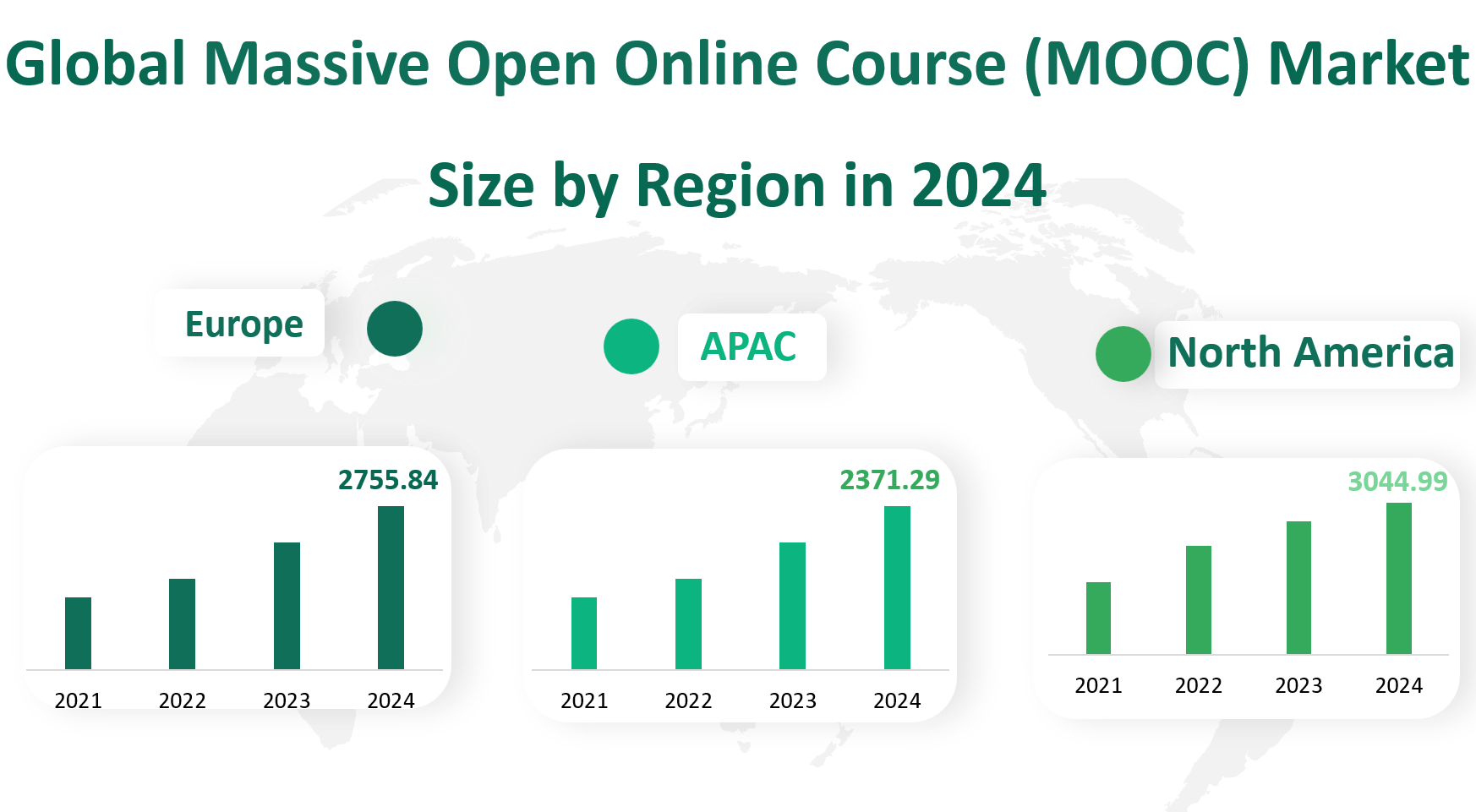1. Global Massive Open Online Course (MOOC) Market Insight Analysis
In 2024, the global Massive Open Online Course (MOOC) market revenue reached 8,696.75 million USD, with a Compound Annual Growth Rate (CAGR) of 14.07% from 2024 to 2033.
A Massive Open Online Course (MOOC) is an educational initiative designed to provide unlimited participation and open access to learning materials through the internet. MOOCs have revolutionized the education sector by offering flexible learning opportunities to individuals globally, regardless of geographical constraints.
The appeal of MOOCs lies in their ability to democratize education by offering high-quality courses from renowned institutions at little to no cost. This accessibility has made them particularly popular in regions with limited educational resources, providing learners with opportunities to enhance their skills and knowledge without the need for physical attendance. The flexibility of MOOCs allows learners to study at their own pace, making it easier to balance education with work and personal commitments.
Figure Global Massive Open Online Course (MOOC) Market Size (M USD) and CAGR (2024-2033)

2. Driving and Limiting Factors of Massive Open Online Course (MOOC) Market Growth
The growth of the MOOC market is driven by several key factors. Firstly, the increasing demand for higher education and professional development has led many individuals to seek affordable and flexible learning options. MOOCs offer a cost-effective alternative to traditional education, allowing learners to access a wide range of courses without the financial burden of tuition fees. This has been particularly beneficial for students in developing countries and those looking to upskill without interrupting their careers.
Another significant driver is the advancement in internet infrastructure and digital literacy. As more people gain access to the internet and become proficient in using digital tools, the potential audience for MOOCs continues to expand. The COVID-19 pandemic has also played a crucial role in accelerating the adoption of online learning, as it forced educational institutions and individuals to adapt to remote learning environments. This shift has highlighted the convenience and effectiveness of MOOCs, leading to a sustained increase in their popularity even after the pandemic.
However, the MOOC market also faces several limiting factors. One of the primary challenges is the high dropout rate, as the self-directed nature of online learning requires a high level of motivation and discipline from learners. Additionally, language barriers and the need for digital literacy can hinder the accessibility of MOOCs for some users. The lack of formal accreditation for many MOOC courses can also limit their appeal to those seeking recognized qualifications. Finally, the quality and consistency of content across different platforms can vary, which may affect the perceived value of MOOCs.
3. Technology Innovation and Corporate Mergers and Acquisitions in Massive Open Online Course (MOOC) Market
The MOOC market has seen significant technological innovation in recent years, driven by the need to enhance the learning experience and improve engagement. One notable trend is the integration of artificial intelligence (AI) and machine learning (ML) to personalize learning paths and provide adaptive assessments. These technologies enable MOOC platforms to tailor content to individual learners’ needs, thereby increasing the effectiveness of online education.
Another area of innovation is the development of interactive and immersive learning tools, such as virtual reality (VR) and augmented reality (AR). These technologies can create more engaging and realistic learning environments, particularly for subjects that require hands-on experience. Additionally, the use of blockchain technology is being explored to provide secure and verifiable credentials for MOOC completions, addressing concerns about the authenticity of online certifications.
Corporate mergers and acquisitions have also played a significant role in shaping the MOOC market. For example, 2U Inc.’s acquisition of Trilogy Education Services in 2019 expanded the company’s offerings in the digital education space, positioning it as a leader in providing skills training for adult learners. Similarly, Degreed’s acquisition of Pathgather in 2018 enhanced its learning experience platform, allowing it to better serve enterprise clients. These strategic moves reflect the growing importance of MOOCs in the corporate training and development sector.
4. Global Massive Open Online Course (MOOC) Market Size by Type
MOOCs can be broadly categorized into two primary types: XMOOCs and CMOOCs.
XMOOCs (eXtended MOOCs) focus on delivering structured courses with predefined content, often replicating traditional classroom experiences online. They emphasize video lectures, quizzes, and assessments. Examples include Coursera and edX, which partner with universities and institutions to offer courses across various disciplines. With a revenue forecast of $6,319.84 million USD in 2024, XMOOCs hold the majority of the market share at 72.67%.
CMOOCs (Connectivist MOOCs) prioritize a more interactive and collaborative learning environment. They encourage learners to connect with each other, share resources, and engage in discussions. CMOOCs are based on the principles of connectivism, emphasizing the importance of networks and connections in learning. Examples include platforms like FutureLearn, which foster community-driven learning experiences. CMOOCs are projected to generate revenues of $2,376.91 million USD in 2024, accounting for 27.33% of the market share.
Table Global Massive Open Online Course (MOOC) Market Size by Type in 2024
|
Market Size (M USD) 2024 |
Market Share | |
|
XMOOC Platforms |
6319.84 |
72.67% |
|
CMOOC Platforms |
2376.91 |
27.33% |
5. Global Massive Open Online Course (MOOC) Market Size by Application
K-12 Education: MOOCs designed for primary and secondary school students, focusing on foundational subjects and skill development. With a projected revenue of $925.25 million USD, K-12 MOOCs hold a market share of 10.64%. The increasing adoption of digital learning in primary and secondary education has contributed to the growth of this segment.
University Education: Courses aimed at college and university students, offering academic content and degree programs. This segment is projected to generate the highest revenue at $4,626.77 million USD, holding a market share of 53.20%. The demand for higher education and the increasing need for flexible learning options have driven the growth of university-focused MOOCs. Platforms like Coursera and edX offer a wide range of degree programs and specialized courses, catering to students worldwide.
Adult and Elderly Education: MOOCs tailored for adult learners and seniors, focusing on lifelong learning, skill enhancement, and personal enrichment. This segment is forecasted to generate $1,574.75 million USD in revenue, holding a market share of 18.11%. The growing emphasis on lifelong learning and personal enrichment has driven the popularity of MOOCs for adult and elderly learners.
Corporate Training: Programs designed for corporate environments, addressing professional development, upskilling, and industry-specific training needs. This application area is expected to contribute $1,569.98 million USD in revenue, with a market share of 18.05%. The increasing need for workforce upskilling and reskilling has fueled the demand for corporate MOOCs.
Table Global Massive Open Online Course (MOOC) Market Size by Application in 2024
|
Application |
Market Size (M USD) 2024 |
Market Share |
|
K-12 Education |
925.25 |
10.64% |
|
University Education |
4626.77 |
53.20% |
|
Adult and Elderly Education |
1574.75 |
18.11% |
|
Corporate |
1569.98 |
18.05% |
6. Global Massive Open Online Course (MOOC) Market by Top Regions
North America has been at the forefront of the MOOC market, driven by the United States and Canada. The region’s robust economy and high internet penetration rate have facilitated the rapid adoption of online learning platforms. Additionally, the presence of major MOOC providers such as Coursera, edX, and 2U Inc. has further bolstered the market. The North America accounted for 3044.99 million USD in 2024, reflecting its significant contribution to the regional market.
Europe is the second-largest regional market, with a revenue of $2,755.84 million USD in 2024 and a market share of 31.26%. The European MOOC market has been supported by strong educational traditions and a growing demand for lifelong learning. Countries such as the United Kingdom, Germany, and France have been particularly active in promoting online education. The European Union’s initiatives to standardize and recognize online credentials have also played a crucial role in the region’s market growth.
Asia-Pacific is the fastest-growing regional market, with a revenue of $2,371.29 million USD in 2024 and a market share of 27.27%. The region’s rapid economic development, increasing internet penetration, and large student population have driven the demand for MOOCs. China and India, in particular, have emerged as significant markets due to their vast populations and growing middle classes. China alone accounted for $722.20 million USD in 2020, highlighting its potential for further growth.
South America and the Middle East & Africa have smaller market shares but are also experiencing growth. South America’s market revenue reached $171.73 million USD in 2024, while the Middle East & Africa’s revenue was $352.90 million USD. These regions are expected to expand further as their economies develop and internet access becomes more widespread.
Figure Global Massive Open Online Course (MOOC) Market Size by Region in 2024

7. Global Massive Open Online Course (MOOC) Market Analysis by Major Players
7.1 Cengage Learning
Introduction and Business Overview: Cengage Learning is a global education and technology company headquartered in Boston, Massachusetts. Established in 2007, the company serves the higher education, K-12, professional, library, and labor training markets. Cengage Learning is known for its flexible learning tools that enable students to access content anytime and anywhere.
Products: Cengage Learning offers a wide range of educational products, including digital textbooks, online learning platforms, and educational software. Its flagship product, WebAssign, provides open educational resources (OER) and economical online learning tools for managing courses.
7.2 2U Inc.
Introduction and Business Overview: 2U Inc., headquartered in Lanham, Maryland, is a global leader in educational technology. Founded in 2008, the company partners with top-tier universities to deliver high-quality online degree programs and short courses. 2U Inc. focuses on higher education, online education, and software as a service (SaaS).
Products: 2U Inc. offers a comprehensive suite of online education solutions, including undergraduate and postgraduate degrees, professional certificates, boot camps, and short courses. Its Career Curriculum Continuum (CCC) provides structured learning paths for students at different stages of their careers.
7.3 Pearson
Introduction and Business Overview: Pearson is a global learning company headquartered in London, UK. Established in 2009, Pearson provides content, assessment, and digital services to learners, educational institutions, employers, and governments worldwide. The company is committed to helping learners acquire the skills needed for success in a rapidly changing work environment.
Products: Pearson offers a wide range of educational products, including K-12 online curricula, higher education courses, and professional development programs. Its online platform, Pearson Online Academy, provides a structured curriculum for K-12 students, focusing on critical thinking, communication, creativity, and collaboration.

